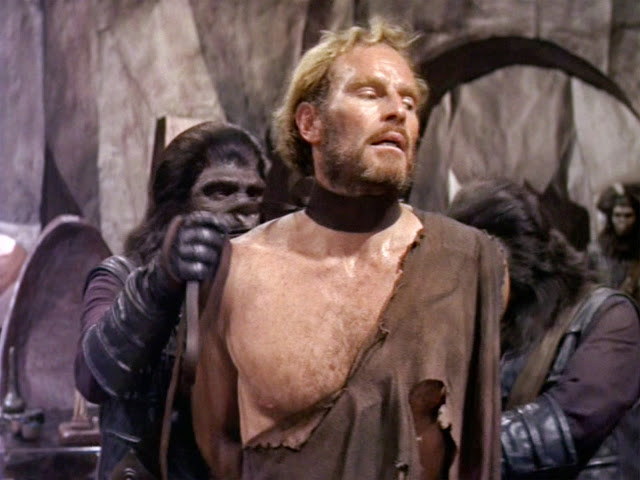
Planet of the Apes (1968) / Sci Fi-Adventure
MPAA Rated: G (probably PG-13 today for violence, some nudity, and some language
Running Time: 112 min.Cast: Charlton Heston, Kim Hunter, Roddy McDowall, Maurice Evans, Linda Harrison, James Whitmore, Robert Gunner, Lou Wagner, Woodrow Parfrey
Director: Franklin J. Schaffner
Screenplay: Michael Wilson, Rod Serling (based on the book by Pierre Boulle)
Review published July 13, 2014
 Charlton Heston
(The Omega Man,
Tombstone) stars as American astronaut George Taylor, who is
returning back to Earth from a mission that has aged them six months,
though many years have actually passed on the home planet. However,
while in cryogenic sleep, he and his crewmen end up crash landing on a
planet that they didn't expect -- a desolate orb that eventually
reveals a topsy-turvy world in which highly-intelligent apes are in
charge and humans are the dumb animals they experiment on. Taylor ends
up captured by armed gorillas along with a group of other humans and
locked in a cage, and soon proves himself to the apes to be far more
advanced than any human they've ever known, causing a schism between
them between the scientists who want to study him and the political
leaders who want to eradicate him for the threat to the balance of
things he presents.
Charlton Heston
(The Omega Man,
Tombstone) stars as American astronaut George Taylor, who is
returning back to Earth from a mission that has aged them six months,
though many years have actually passed on the home planet. However,
while in cryogenic sleep, he and his crewmen end up crash landing on a
planet that they didn't expect -- a desolate orb that eventually
reveals a topsy-turvy world in which highly-intelligent apes are in
charge and humans are the dumb animals they experiment on. Taylor ends
up captured by armed gorillas along with a group of other humans and
locked in a cage, and soon proves himself to the apes to be far more
advanced than any human they've ever known, causing a schism between
them between the scientists who want to study him and the political
leaders who want to eradicate him for the threat to the balance of
things he presents.